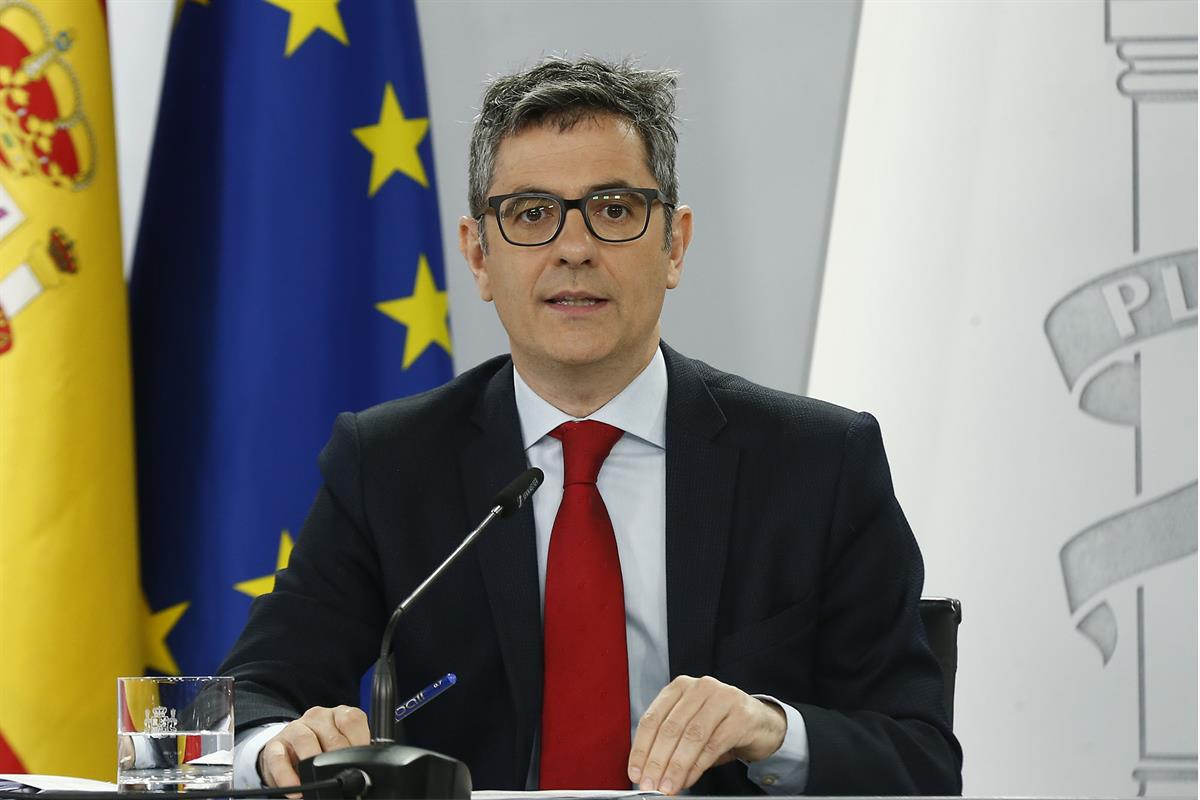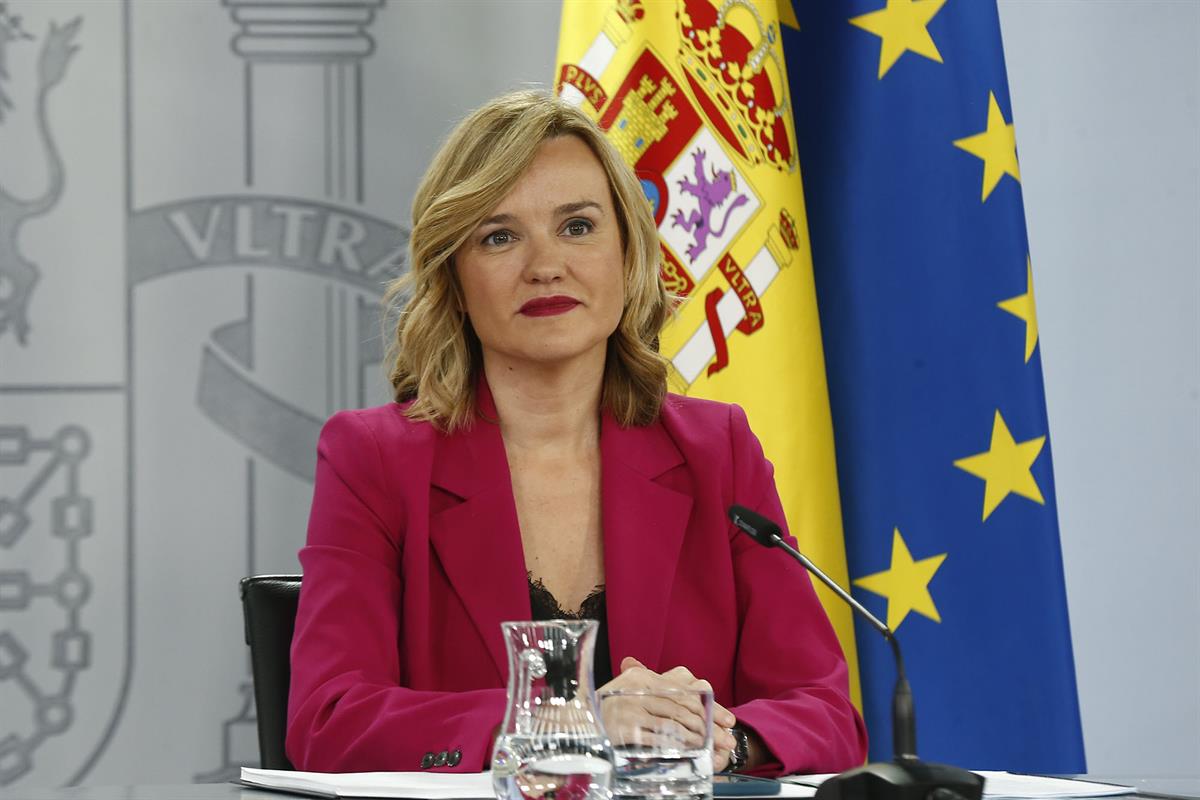Council of Ministers
Government of Spain presents measures to recognise, prevent and redress sexual abuse within the Church
Council of Ministers - 2024.4.23
Moncloa Palace, Madrid
 The Minister for Education and Vocational Training and Sports and Government Spokesperson, Pilar Alegría, and the Minister for the Presidency, Justice and Parliamentary Relations, Félix Bolaños, at the press conference (Pool Moncloa/José Manuel Álvarez)
The Minister for Education and Vocational Training and Sports and Government Spokesperson, Pilar Alegría, and the Minister for the Presidency, Justice and Parliamentary Relations, Félix Bolaños, at the press conference (Pool Moncloa/José Manuel Álvarez)
The Council of Ministers has approved the Plan of response and implementation of the Ombudsman's report on sexual abuse in the Catholic Church and the role of the public authorities, in the preparation of which seven ministries have participated.
The Minister for the Presidency, Justice and Parliamentary Relations, Félix Bolaños, recalled that in March 2022, the Lower House of Parliament mandated the Ombudsman to create an independent commission to study allegations of sexual abuse within the Catholic Church. The conclusions, according to Bolaños, were "forceful and very clear, after painstaking work".
The report concluded that 440,000 people may have been sexually abused in Spain, and half of these cases may have been committed by members of the Catholic Church, which "did not provide an adequate response to the problem", the minister said.
Félix Bolaños added that the Ombudsman's document considers it "necessary and essential" that the public authorities respond to this situation, recognise the damage, adopt measures to prevent possible future abuses and to repair the damage suffered by the victims.
Lines of action of the plan
 The Minister for the Presidency, Justice and Parliamentary Relations, Félix Bolaños, during his speech at the press conference after the Council of Ministers | Pool Moncloa/José Manuel Álvarez
The Minister for the Presidency, Justice and Parliamentary Relations, Félix Bolaños, during his speech at the press conference after the Council of Ministers | Pool Moncloa/José Manuel Álvarez
The Government is presenting the implementation plan for the report today, the minister said, with the aim of settling a debt to the victims who were forgotten for decades, making reparations for the harm suffered and putting them at the centre of political action.
The Government's initiatives to achieve these objectives are organised along five main lines: recognition and reparation; support for victims; prevention; training and awareness-raising; and information and research.
Félix Bolaños has detailed that the Government plans to organise a public event with the victims and their families, which will be the first step towards symbolic reparation. Adequate material reparation in economic terms is also foreseen. To this end, the plan envisages legal and administrative measures to support victims who have not prosecuted. Thus, the limitation period for civil liability will not start to run until the victim has reached the age of 35. In addition, some offences will be considered imprescriptible and can therefore be prosecuted at any time.
With regard to comprehensive support for victims, the minister gave his assurance that they will receive optimal treatment in specialised services. In addition, safe environments will be created so that victims do not have contact with their aggressor in legal proceedings and free legal aid will be guaranteed for all victims.
In the area of prevention of sexual abuse of children and adolescents, Bolaños said that the work of supervising educational inspections will be strengthened and welfare and protection coordinators will be trained in schools.
The minister also indicated that training and awareness-raising content will be included in the curricula of teachers or professionals in any field who are or may be in contact with minors.
Research into the causes of violence against children and the improvement of information and data collection systems will facilitate decision-making and the implementation of public policies, the minister concluded.
Félix Bolaños specified that all these measures will be implemented between 2024 and 2027, the period of validity of the plan. The government's objective, he said, is to carry out public policies that put victims at the centre and to repair the damage caused in collaboration with the Catholic Church, with which talks have begun so that it "covers and assumes the cost of financial reparation" for sexual abuse committed in its sphere.
"The Church has acknowledged the existence of these abuses and I know that they are also working on how to make comprehensive reparations to the victims. I don't think anyone would understand if the Spanish Church did not act as other countries around us have acted, such as Ireland, France, Belgium, or other countries outside the Union, such as the United States", the minister stressed.
Reform of the Central Sex Offenders' Register
The Government has amended the regulation on the current Central Sexual Offenders' Register in order to reinforce its functions of comprehensive protection of children and adolescents.
The minister for the Presidency, Justice and Parliamentary Relations recalled that the register, in operation since 2016, ensures that no one with a record of sexual offences can work in contact with minors. "It is a free database, but not a public one, which all citizens can access to obtain a non criminal record certificate in order to be able to work in a trade that has to do with minors," he remarked.
The first amendment adopted today is that the register will incorporate information on persons convicted of trafficking in human beings, irrespective of the age of the victim. The name of the registry will be changed to the Central Registry of Sex Offenders and Persons Trafficking in Human Beings.
The second new feature, according to Félix Bolaños, is that companies, institutions, NGOs and some professional associations will be able to periodically request a non criminal record certificate from their employees who are in regular contact with minors, with their consent. This prevents persons who have committed an offence after having been recruited from associating with minors.
The third reform means that the regulation empowers people between 16 and 18 years of age, such as camp leaders or lifeguards, to apply for the certificate directly from the registry, rather than through their parents or guardians.
The fourth modification involves connecting the European criminal record information system with the Spanish one, so that European Union citizens who want to work in Spain will simultaneously obtain the two certificates required of them: the certificate of lack of a criminal record in Spain and the certificate of lack of a criminal record in their country of origin.
The minister also reported that the regime for cancelling sentences handed down to persons convicted of sexual offences by foreign judges or courts will be brought into line with the Spanish regime.
"With this reform we are increasing cooperation with other neighbouring countries and taking measures that simplify bureaucracy as much as possible. Procedures that could take weeks can now be done with a click of a button, in just minutes," he concluded.
Corresponsables Plan: 190 million for communities
 The Minister for Education, Vocational Training and Sports and Government Spokesperson, Pilar Alegría, during her speech at the press conference after the Council of Ministers | Pool Moncloa/José Manuel Álvarez
The Minister for Education, Vocational Training and Sports and Government Spokesperson, Pilar Alegría, during her speech at the press conference after the Council of Ministers | Pool Moncloa/José Manuel Álvarez
The Minister for Education, Vocational Training and Sports and Government Spokesperson, Pilar Alegría, referred to the agreement approved by the Council of Ministers to distribute 190 million euros to the autonomous communities and cities as part of the Corresponsables Plan 2024..
According to Alegría, this plan aims to facilitate the work-life balance of families with children under the age of 16, through the promotion of quality employment and the implementation of professional care services. "A measure that is clearly part of this government's project, which is to consolidate rights and, of course, to continue improving the lives of citizens", she stressed.
Women's Champions League Final
In the field of sport, the Minister for Education, Vocational Training and Sports reported on the approval by the Council of Ministers of the agreement that will allow Bilbao to host the final of the Women's Champions League in 2024 and the Europa League in 2025. The agreement establishes all the guarantees to be able to undertake these international events, with special attention to logistical and security issues.
World Book Day and the defence of intellectual property rights
As part of the celebration of World Book Day, Pilar Alegría began her speech at the press conference by congratulating all professionals in the sector and encouraging the public to read books, "places of refuge, where we learn to understand and comprehend the world".
Also in the field of creation, the spokeswoman referred to the institutional declaration approved by the Council of Ministers on the occasion of World Intellectual and Industrial Property Day, which will be celebrated next Friday. "Spain has been, is and wants to continue to be a country of creators", explained Alegría, who stressed that with this declaration the government expresses its "firm determination to defend, protect and promote intellectual and industrial property rights, in order to stimulate artistic and literary creativity, as well as research and innovation".
Non official translation




